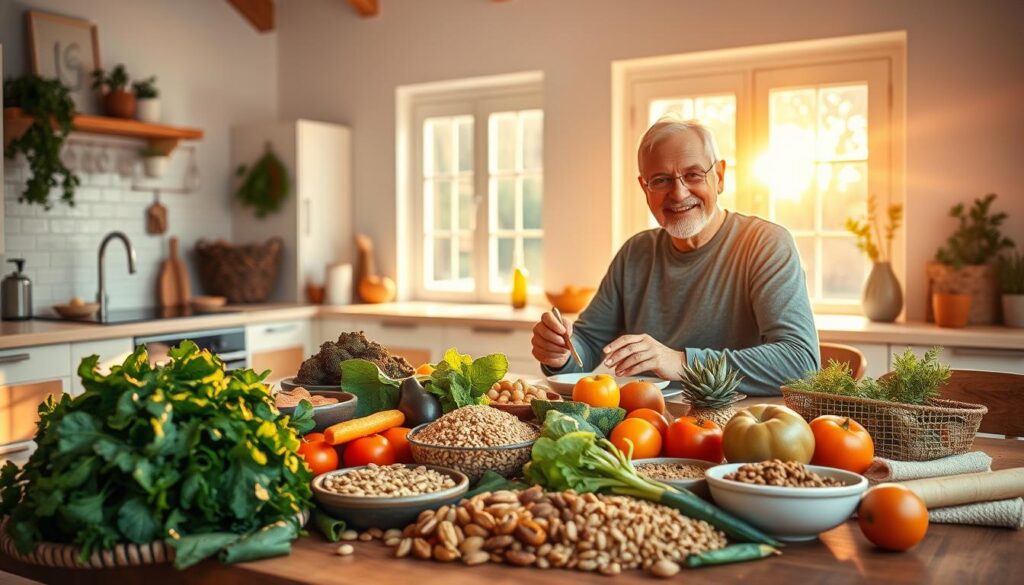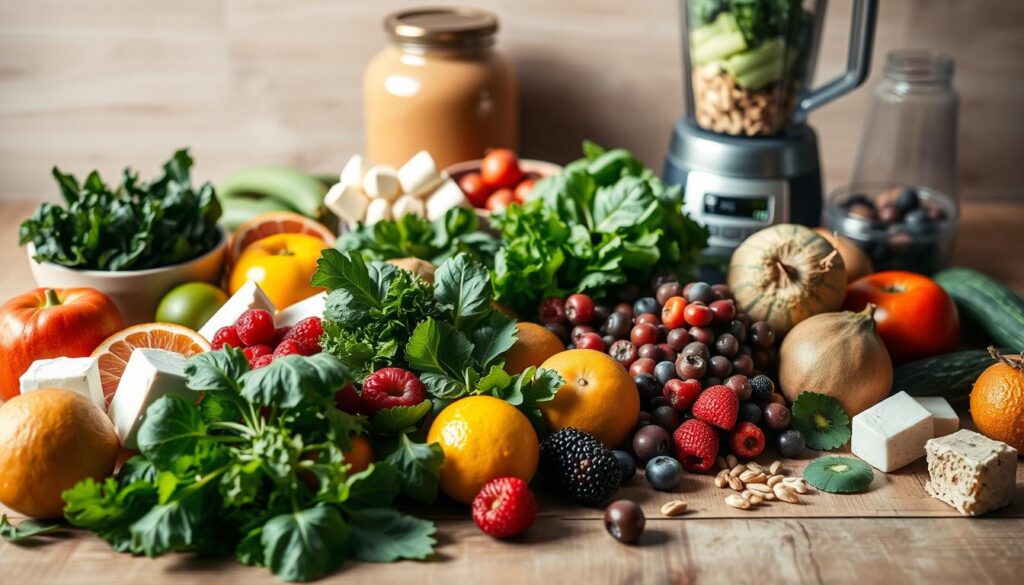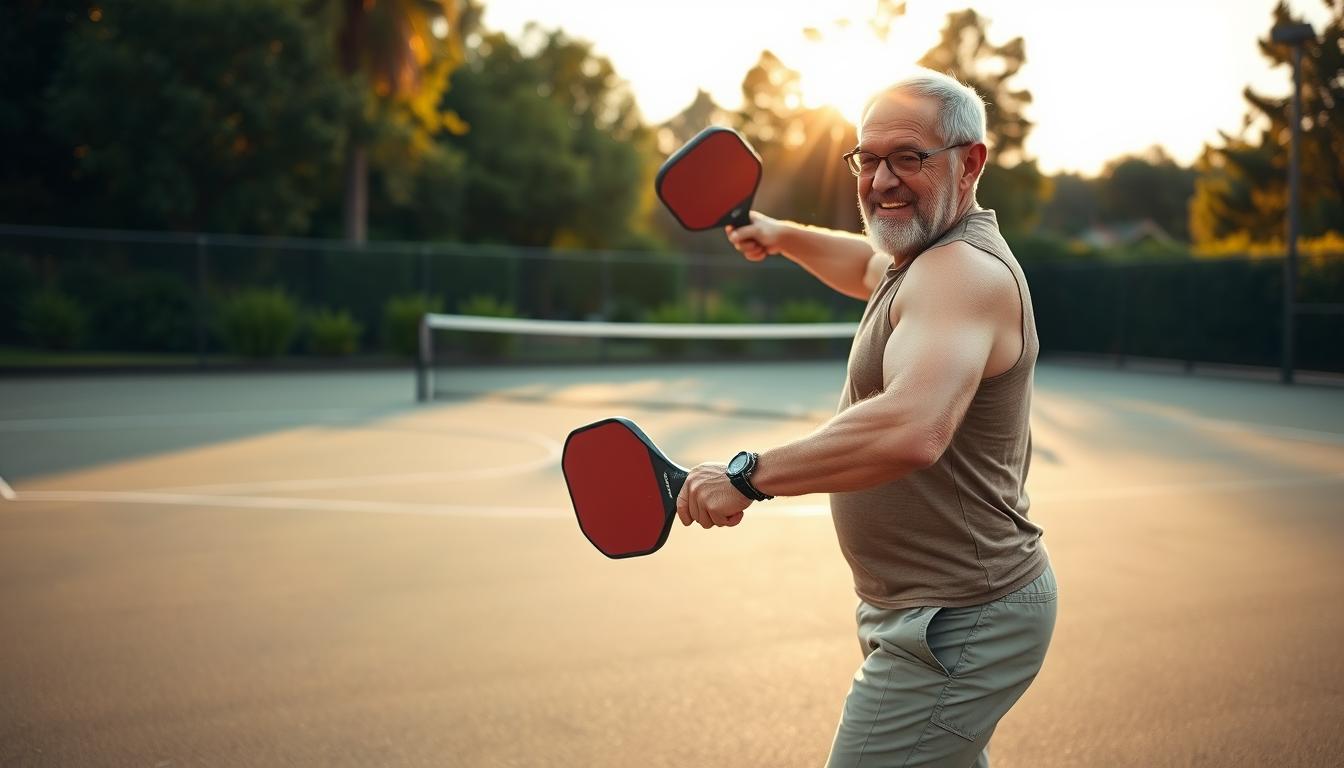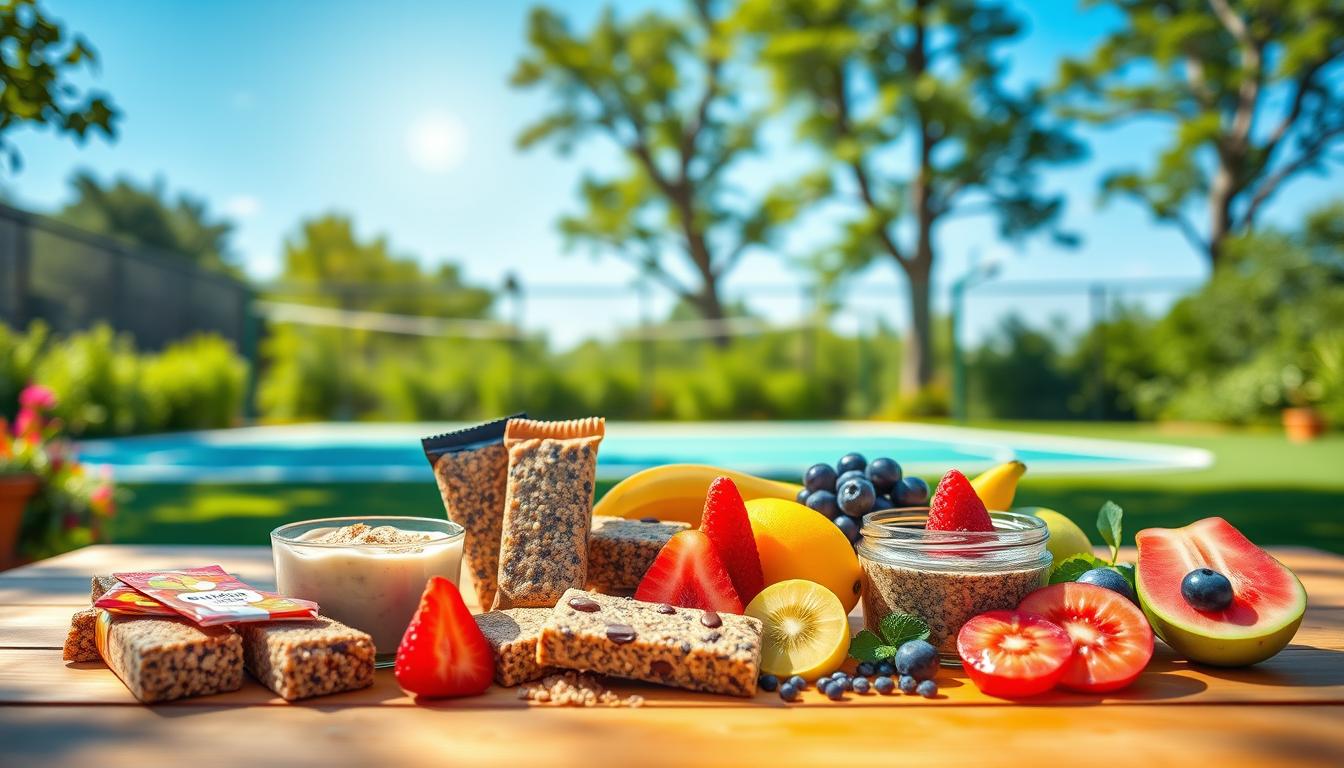Ever wondered if the secret to more energy and better recovery on the pickleball court is in your diet? Vegan nutrition is becoming a game-changer for pickleball players over 50. It offers a complete plan for top performance and quick recovery. As older athletes play this fast-paced sport, knowing how to mix the right nutrients is key to staying energized and strong.
This section will show how vegan nutrition boosts energy and aids in recovery. It’s the first step in learning how to fuel your body for peak performance.
The Importance of Nutrition in Pickleball for Older Adults
Nutrition is key for older adults playing sports like pickleball. It boosts energy, speeds up recovery, and keeps them healthy. As people get older, their diet needs change. They need foods rich in nutrients to stay strong and agile on the court.
Good nutrition helps a lot in pickleball. Eating foods full of vitamins, minerals, and proteins helps fight off fatigue. This lets players stay quick and agile, which is important in this fast game.

Don’t forget about staying hydrated. Drinking enough water is crucial for older athletes to avoid dehydration. Meeting these dietary needs helps older adults perform their best in pickleball.
Understanding Vegan Nutrition for Players Over 50
As athletes get older, their nutrient needs change. It’s key to adjust their diet. For vegan athletes over 50, knowing vegan nutrition is vital. It helps keep energy up and performance sharp.
A good plant-based diet can help aging bodies. It aids in faster recovery and better muscle health.
Older athletes have special challenges, like absorbing nutrients less well. This makes it crucial to eat nutrient-rich foods. Protein, vitamins, and minerals are vital for muscle and health.
Eating a variety of foods like legumes, whole grains, nuts, seeds, and fruits and veggies is important. It helps meet needs for B12, calcium, and iron. This prevents age-related deficiencies.
Knowing your nutrient needs and how to get them through vegan eating is powerful. It helps older athletes perform better. A balanced vegan diet supports both physical health and athletic performance.

The Role of Carbohydrates in Energy Supply
Carbohydrates are key for vegan athletes, especially in sports like pickleball. They help provide energy and boost performance. Knowing the different types of carbs is crucial for athletes to fuel their bodies right.
Complex Carbohydrates vs. Simple Sugars
It’s important to know the difference between complex carbs and simple sugars. Complex carbs, found in whole grains and legumes, give long-lasting energy. They’re perfect for long sports sessions.
Simple sugars, however, cause quick energy boosts followed by crashes. This can hurt performance. Vegan athletes should focus on complex carbs for steady energy, keeping stamina and focus up.
Best Sources of Carbohydrates for Vegan Athletes
Picking the right carbs is key for energy and performance. Here are some top choices for vegan athletes:
| Food Source | Type of Carbohydrate | Energy Value (per 100g) | Nutrients |
|---|---|---|---|
| Oatmeal | Complex | 66g | Fiber, Iron, Magnesium |
| Whole Grains | Complex | 60g | B Vitamins, Fiber, Magnesium |
| Sweet Potatoes | Complex | 20g | Vitamin A, Fiber |
| Bananas | Simple | 23g | Potassium, Vitamin C |
| Legumes | Complex | 40g | Protein, Fiber, Iron |
These carbs not only give energy but also add important nutrients for older athletes. Adding them to a vegan diet can really help with pickleball performance.
Essential Proteins for Muscle Maintenance
Protein is key for athletes, especially those over 50 playing pickleball. As we age, keeping muscle mass is vital. Eating the right amount of protein in recovery meals helps maintain muscles and boosts performance.
Importance of Protein in Recovery
Enough protein helps fix muscle damage after hard play. For older athletes, this is even more important since muscles naturally shrink with age. Meals high in protein speed up healing and help athletes bounce back, keeping them in the game they love.
Top Vegan Protein Sources
High-quality vegan proteins meet nutritional needs without animal products. Here are some top picks:
- Lentils – Full of protein and fiber, lentils are great in many dishes.
- Chickpeas – These legumes are fantastic in salads and as a protein-rich hummus base.
- Quinoa – This grain has all nine essential amino acids, making it a complete vegan protein.
- Tofu – A versatile ingredient, tofu adds protein to many recipes, aiding in muscle upkeep.
Vegan Nutrition for Players Over 50: Balancing Fats
Healthy fats are key in a vegan diet for athletes over 50. They give lasting energy and help with joint health, brain function, and hormones. Knowing which fats to eat is crucial for top performance in sports like pickleball.
Healthy Fats and Their Benefits
Healthy fats, like those in avocados, nuts, and seeds, keep energy up all day. They boost heart health, help with vitamin absorption, and keep cells working right. As athletes get older, these fats become even more important for staying healthy and active.
Incorporating Omega-3 Fatty Acids into Your Diet
Omega-3 fatty acids fight inflammation and keep the heart healthy, key for aging well. Flaxseeds, chia seeds, and walnuts are great vegan sources. Eating these foods daily can help with recovery and joint health, keeping players quick and sharp on the court. Flaxseed oil and algae-based supplements can also help increase omega-3 levels.
| Source of Healthy Fats | Type of Fat | Health Benefits |
|---|---|---|
| Avocados | Monounsaturated | Improves heart health, aids in nutrient absorption |
| Chia Seeds | Omega-3 Fatty Acids | Reduces inflammation, promotes brain health |
| Walnuts | Omega-3 Fatty Acids | Supports heart health, enhances cognitive function |
| Olive Oil | Monounsaturated | Promotes skin health, supports cardiovascular function |
Hydration Strategies for Pickleball Players
Drinking enough water is key for pickleball players, especially those over 50. Playing sports makes it important to stay hydrated. This helps avoid feeling tired, overheated, and dizzy. Drinking water can really help players do their best on the court.
Why Hydration is Essential for Performance
Hydration is very important for athletes. Not drinking enough water can make you feel weak, move slowly, and react late. For pickleball players, this can mean losing a game. Drinking enough water keeps players sharp and quick during matches.
Timely Hydration Before Matches
Players should drink water a few hours before playing, aiming for 16-20 ounces. This helps them stay hydrated and perform better. Drinking more water just before the game ensures players are ready to go, helping them play their best.
Pre-Match Nutrition for Optimal Performance
Getting ready for a pickleball match is more than just training. What you eat before the game is key to doing your best. Knowing when to eat is important. It helps your body get ready for the game.
The right food before a match can give you more energy. It can also help you play better.
Timing Your Meals Before Play
Eat a meal full of carbs 3-4 hours before playing. This lets your body digest it well. So, you have energy for the game.
Eating too soon before playing can make you feel bad. It might even slow you down, even if you ate something good.
Snack Ideas Before a Pickleball Match
Before the game, small snacks can give you a quick energy boost. Here are some good snack ideas:
- Fig bars for a sweet, natural source of carbohydrates.
- Nut butter spread on whole grain toast for a combination of carbs and healthy fats.
- A banana, providing potassium and quick energy.
Post-Match Recovery Meals and Snacks
Refueling after a pickleball match is key for quick recovery and energy boost. Proper nutrition helps repair muscles and gets players ready for the next day’s training. It’s important to eat a mix of protein and carbs within an hour of the game.
The Importance of Refueling
After intense play, the body needs to refill glycogen stores and fix muscles. Meals rich in carbs and protein are vital. Choose foods that help you recover fast, so you’re ready for the next challenge.
Quick, Vegan Recovery Snacks
Vegan snacks are a great way to recover after a match. Here are some good options:
- Protein smoothie made with plant-based protein powder, almond milk, and a banana.
- Energy bars with oats, nuts, and dried fruits.
- Whole grain toast with almond butter and sliced banana.
- Chickpea salad with diced veggies and lemon-tahini dressing.
- Quinoa mixed with black beans and salsa for a filling meal.
These vegan snacks help with recovery and fit well into a busy schedule. They keep energy levels up and support muscle repair, essential for pickleball.
Supplementation Strategies for Vegan Players Over 50
A balanced diet is key for health, but some supplements can help vegan athletes over 50. They face special dietary challenges. This is especially true for protein and vitamins, which might be hard to get from plants.
Key Supplements to Consider
Vegan athletes might want to think about these supplements:
- Protein Powders – Good for muscle recovery after working out.
- Vitamin B12 – Important for energy, as it’s mostly in animal products.
- Omega-3 Fatty Acids – Good for heart and joint health; flaxseed oil is a plant-based choice.
- Vitamin D – Key for bone health, especially in winter with less sunlight.
Discussing Supplements with Your Healthcare Provider
Always talk to a healthcare provider before starting supplements. They can help ensure you get what you need without risks. This way, you can improve your health and performance.
Supporting Endurance with Long-Term Nutritional Strategies
For pickleball players over 50, keeping up endurance is key. Good meal planning before and after training boosts energy and stamina. It’s all about recovery and keeping energy levels up.
Meal Planning Around Training
Good meal planning is a must for endurance athletes. Eating right before training gives you the fuel you need. Choose foods rich in nutrients, especially around your training times.
- Pre-training meals should have easy-to-digest carbs and some protein.
- Drinking water before and after training helps with recovery and performance.
- After training, eat a balanced meal to help your muscles recover and rebuild.
Macronutrient Balance for Sustained Energy
Getting the right mix of carbs, proteins, and fats is crucial for lasting energy in pickleball. Each macronutrient has its role in supporting your training. The right mix can prevent tiredness and aid in quick recovery.
| Macronutrient | Function | Suggested Sources |
|---|---|---|
| Carbohydrates | Primary source of energy | Quinoa, brown rice, fruits, sweet potatoes |
| Proteins | Muscle repair and recovery | Lentils, chickpeas, tofu, tempeh |
| Fats | Long-lasting energy source | Avocado, nuts, seeds, olive oil |
Injury Prevention Through Nutrition
Nutrition is key for preventing injuries in pickleball players, especially those over 50. Eating the right foods can lower injury risks and help heal faster. Good food choices help players stay active and healthy for longer.
Anti-inflammatory Foods for Recovery
Anti-inflammatory foods are great for older athletes’ recovery. Foods packed with antioxidants and omega-3s are especially good. Here are some examples:
- Leafy greens, such as spinach and kale
- Walnuts and flaxseeds for healthy fats
- Blueberries and strawberries as natural sweet options
- Avocados for their monounsaturated fats
These foods fight inflammation and boost health. They’re key for keeping energy up and recovery smooth.
Maintaining Joint Health as You Age
Joint health is crucial as players get older. Omega-3s in chia seeds and fatty fish, and antioxidants in fruits and veggies, are vital. They help:
- Lower joint pain and stiffness
- Boost mobility and flexibility
- Speed up recovery after playing
By choosing the right foods, older athletes can keep playing well and avoid injuries. This is thanks to good nutrition.
Building Mental Focus and Clarity Through Diet
Eating right is key for better mental focus and brain power, especially for pickleball players over 50. Adding certain nutrients to your meals can help you think clearer and make better decisions on the court. It’s all about knowing what foods support your brain and adding them to your daily diet.
Nutrients That Support Cognitive Functions
Omega-3 fatty acids in walnuts and flaxseeds are great for your brain. They help improve how well you think. Antioxidants from fruits and veggies fight off stress in your brain, helping you remember things better. These foods not only make you think sharper but also keep you healthy overall.
Foods That Boost Mental Sharpness
Whole grains like quinoa and brown rice give you steady energy and focus. Nuts, especially almonds and walnuts, are full of good fats and protein. Berries, like blueberries and strawberries, are loaded with antioxidants that boost your brain power. Eating these foods regularly can help you perform better in sports and everyday life.
| Food | Key Nutrient | Benefit |
|---|---|---|
| Walnuts | Omega-3 Fatty Acids | Supports brain health |
| Blueberries | Antioxidants | Enhances cognitive function |
| Quinoa | Complex Carbohydrates | Provides sustained energy |
| Spinach | Vitamins A & K | Aids in mental clarity |
| Almonds | Vitamin E | Improves memory function |
Community and Support for Vegan Athletes
Finding a strong community is key for vegan athletes, especially those over 50. Connecting with others who share your goals boosts motivation. It also offers valuable insights into nutrition and training.
Many athletes find great support in groups focused on vegan nutrition. Here, they can share experiences, tips, and healthy recipes. This exchange can inspire confidence and keep athletes committed to their nutritional paths.
Join Vegan Nutrition Groups or Forums
Being part of vegan nutrition groups or forums is very helpful. These platforms are great for discussing meal planning, dietary approaches, and athletic performance on a vegan diet. Sharing experiences can inspire confidence and help athletes stay committed to their nutritional paths.
Resources for Older Vegan Athletes
Older vegan athletes need tailored resources to optimize their nutrition. Books, online courses, and local workshops on plant-based diets are very helpful. These resources educate and offer practical advice for older athletes.
Learning about nutrient timing, supplementation, and meal prep is crucial. It helps optimize performance and recovery. This knowledge is essential for older athletes.
Real Success Stories: Vegan Players Over 50
In pickleball, many vegan athletes over 50 have become role models. Their wellness journeys and nutritional changes inspire others. They show how a plant-based diet can boost athletic performance and health.
Inspirational Picks from the Court
Several vegan athletes have made a big impact. They’ve shown their skills and shared their experiences. Their stories show how a vegan diet can improve endurance, strength, and recovery.
Lessons Learned from Their Nutrition Journey
Vegan athletes face challenges when changing their diet. They’ve learned valuable lessons about meal planning and diverse foods. Their stories prove that dedication to a vegan lifestyle can lead to great results.
The Impact of Veganism on Overall Health
A vegan diet can be a great way to boost your health. It focuses on plant-based foods, which are good for you. This lifestyle can help lower the risk of chronic diseases and improve heart health.
Knowing these benefits can inspire people, especially those over 50, to try a vegan diet. It’s a step towards living longer and healthier.
Long-Term Health Benefits of a Vegan Diet
Choosing a vegan diet can bring many health perks. Studies show that people on plant-based diets have less heart disease, diabetes, and some cancers. A vegan diet is full of fruits, veggies, legumes, and whole grains.
This diet helps with weight management and getting the nutrients you need. It can help you live longer and stay active as you age.
Common Misconceptions about Vegan Nutrition
Some think a vegan diet lacks protein or important nutrients. But, a well-planned vegan diet can give you everything you need. You just need to eat a variety of foods like legumes, nuts, seeds, and fortified products.
By doing this, you can enjoy the health benefits without missing out on anything. Sharing the truth about vegan nutrition can help more people see its value.
Tips for Transitioning to a Vegan Diet
Starting a vegan diet might seem hard, but it can boost your health and energy. This is especially true for pickleball players over 50. With the right guidelines, this journey can be smooth and fun.
Guidelines for New Vegan Athletes
You don’t have to change everything at once. Slowly adding plant-based foods to your meals can help. Here are some tips to make it easier:
- Try plant-based versions of your favorite dishes, like lentils in stews.
- Add vegetables, fruits, legumes, and whole grains to your meals.
- Play with different cooking methods and flavors to keep things interesting.
- Keep an eye on what nutrients you’re getting to make sure you’re getting enough.
Addressing Nutritional Shortfalls
When you stop eating animal products, you might miss out on some nutrients. It’s key to watch for these:
- Vitamin B12: You can find it in fortified foods or supplements.
- Iron: Lentils, chickpeas, and quinoa are good plant-based sources.
- Calcium: Fortified plant milks and leafy greens are good options.
- Omega-3 fatty acids: Flaxseeds and walnuts are great alternatives.
By paying attention to these nutrients, new vegans can stay healthy and perform well.
Challenges of Vegan Nutrition and How to Overcome Them
Starting a vegan diet can be tough, especially for older pickleball players. They might face issues like not having vegan options nearby, finding it hard to cook healthy meals, and living in areas with few food choices. Recognizing these problems is the first step to solving them.
Common Obstacles for Older Players
Older athletes may find it hard to switch to a vegan diet for several reasons:
- Accessibility: It can be hard to find fresh produce and vegan products.
- Meal Preparation: It’s tough to find time and resources to cook healthy meals.
- Nutrition Knowledge: Not knowing enough about vegan nutrition can lead to missing out on important nutrients.
Strategies for Overcoming Nutritional Hurdles
There are ways to beat the challenges of vegan nutrition:
- Meal Planning: Making a meal plan helps with shopping and cooking, ensuring you get the nutrients you need.
- Batch Cooking: Cooking meals in advance saves time and makes it easier to eat well, even when busy.
- Community Resources: Using local farmers’ markets and health food stores can help find fresh, vegan ingredients.
Conclusion
Vegan nutrition is key for pickleball players over 50. It affects their energy and how fast they recover. This article shows how certain foods can boost performance and help players last longer in the game.
By eating a balanced vegan diet, players stay nourished and ready for each match. Hydration and meal planning are also vital. They help players stay strong and recover quickly, making pickleball a joy for years.
Choosing vegan nutrition is more than a diet choice. It’s a way to improve health and energy. Pickleball players over 50 can excel and feel great by following these nutrition tips.




